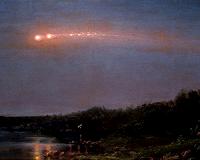 |
Tucson AZ (SPX) Jul 26, 2010 Researchers have aged dated a very important group of meteorites with far greater precision than previously possible by using a different type of radioactive dating on a particularly difficult type of specimen to study. The project found that the asteroid from which ureilite meteorites are derived differentiated - or separated into parts of different composition - within 5 million years of the formation of the Solar System, said Cyrena Anne Goodrich, senior scientist at the Planetary Science Institute. "That is a really short time period," she said. Goodrich's research offered dating with approximately 10 times greater precision than previously available. Most meteorite dating research has looked at two types of meteorite - angrites and eucrites - which contain ample amounts of minerals necessary for the study. Goodrich and her team opted to investigate ureilites. The project's radioactive isotope dating methods looked at short-lived radionuclides rather than the long-lived radionuclides that researchers have studied for years. "Ureilites are the second most abundant group of differentiated meteorites, but they are particularly enigmatic and are very difficult to date because they don't contain many different minerals," she said. Radiometric dating is based on the principle that radioactive elements decay and change into other elements at a constant rate that can be measured in a laboratory. The basic idea behind radioactive dating is that if you can measure the ratio of parent to daughter isotopes in a rock or mineral using a mass spectrometer, which separates isotopes from one another according to their weight, you can calculate its age. "Short-lived radionuclides are isotopes that decay much faster than the long-lived ones. In fact, they decay so quickly that any parent atoms that were present at the time the Solar System formed would have completely changed into daughter isotopes a long time ago," she said. "By measuring the daughter isotopes in several different minerals, it is possible to determine how much of the parent isotope was in the rock when rock formed, and this value can be compared to a known value for how much of the parent was present at some specific time, say at the formation of the Solar System." Goodrich's research, which was funded by NASA grants, studied how isotopes manganese-53 decays to chromium-53 and aluminum-26 decays to magnesium 26. "We were able to apply Mn-Cr and Al-Mg dating to ureilites because I discovered some unusual Mn-rich and Al-rich minerals in a couple of rare types of ureilites," she said. "The results of our work provide the first high-precision ages dates for ureilites, 4.5639 billion years ago, plus or minus 0.00045 billion years (450,000 years)." Earlier dating efforts for ureilites offered precision of only plus or minus 6 million years, she said. "The beauty of this technique is that it has much smaller uncertainties than the long-lived radionuclide dating technique, and the development of this method has resulted in scientists using meteorites to work out many details of what happened in our Solar System in the first 5-6 million years of its history. In particular, they have been able to reconstruct many details of the early differentiation of planetesimals like asteroids." Goodrich is lead author of a paper, "53Mn-53Cr and 26Al-26Mg ages of a feldspathic lithology in polymict ureilites," appearing in Earth and Planetary Science Letters in July. Meteorites are a solid piece of some planetary body - planets, moons, asteroids and comets in our Solar System - other than Earth that got chipped off its "parent body" and made its way to Earth. Meteorites are "free samples" of other bodies, and the vast majority of the world's collections totaling more than 39,000 specimens come from various asteroids. Meteorites are an invaluable source of information about the formation and early evolution of our Solar System, partly because any record of the Earth's earliest history has been destroyed by subsequent geological processing. Without meteorites we would probably know very little about the beginnings of our Solar System, Goodrich said.
Share This Article With Planet Earth
Related Links Planetary Science Institute Asteroid and Comet Impact Danger To Earth - News and Science
 The Walt Whitman Meteor Mystery
The Walt Whitman Meteor MysteryMoffett Field CA (SPX) Jun 03, 2010 In his landmark collection Leaves of Grass, famed poet Walt Whitman wrote of a "strange huge meteor-procession" in such vivid detail that scholars have debated the possible inspiration for decades. Now, a team of astronomers from Texas State University-San Marcos has applied its unique brand of forensic astronomy to the question, rediscovering one of the most famous celestial events of Whi ... read more |
|
| The content herein, unless otherwise known to be public domain, are Copyright 1995-2010 - SpaceDaily. AFP and UPI Wire Stories are copyright Agence France-Presse and United Press International. ESA Portal Reports are copyright European Space Agency. All NASA sourced material is public domain. Additional copyrights may apply in whole or part to other bona fide parties. Advertising does not imply endorsement,agreement or approval of any opinions, statements or information provided by SpaceDaily on any Web page published or hosted by SpaceDaily. Privacy Statement |